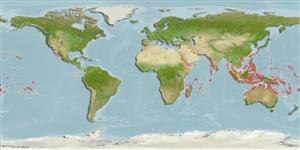Environment: milieu / climate zone / depth range / distribution range
Ecologia
marinhas associadas(os) a recifes; não migratória; intervalo de profundidade 1 - 12 m (Ref. 7247). Tropical; 30°N - 30°S
Indo-Pacific: Red Sea and East Africa to the Line, Marquesas, and Tuamoto islands, north to the Ryukyu and Bonin islands, south to New Caledonia and Tonga; throughout Micronesia. Excluding the Hawaiian Islands (Ref. 7247). Hawaiian population refers to Stegastes marginatus (Ref. 86689).
Tamanho / Peso / Idade
Maturity: Lm ? range ? - ? cm
Max length : 14.0 cm TL macho/indeterminado; (Ref. 4391); common length : 9.0 cm TL macho/indeterminado; (Ref. 5450)
Espinhos dorsais (total): 12; Raios dorsais moles (total): 15-17; Espinhos anais 2; Raios anais moles: 12 - 14. Diagnosis: Adults generally brown; dorsal part of head and nape darker, grading to tan on lower part of head and breast. The scales have darker brown margins. The lips are whitish lips; the suborbital is mostly blue; the preopercle and opercle scales with blue centers. The median and pelvic fins are brown; the pectorals are dusky; a well-defined dark brown or blackish spot is sometimes present at base of posteriormost dorsal rays, which distinguishes it from S. lividus where the spot is diffuse. Males in courtship or guarding eggs with broad white bar across middle of body and pale blue stripe from mouth to upper part of pectoral fin (Ref. 510).
Adults inhabit reef flats and lagoon reefs. Frequently occur in colonies associated with live or dead branching staghorn coral (Acropora). Feed on algae, gastropods, sponges, and copepods. Territorial, maintain and 'weed' filamentous algae patches growing on dead coral (Ref. 9710). They attack human intruders without hesitation, sometimes taking painful nips. Particularly aggressive during reproductive periods. The species emit clicking noises during aggressive encounters. Oviparous, males tend the nest visited by several females (Ref. 59295).
Life cycle and mating behavior
Maturidade | Reprodução | Desova | Ovos | Fecundidade | Larvas
Oviparous, distinct pairing during breeding (Ref. 205). Eggs are demersal and adhere to the substrate (Ref. 205). Males guard and aerate the eggs (Ref. 205).
Allen, G.R. and A.R. Emery, 1985. A review of the Pomacentrid fishes of the genus Stegastes from the Indo-Pacific, with descriptions of two new species. Indo-Pac. Fish. (3):31. (Ref. 510)
Categoria na Lista Vermelha da IUCN (Ref. 130435)
Utilização humana
Pescarias: pouco comercial; Aquário: Aquários públicos
Mais informação
ReferênciasAquaculturaPerfil para aquaculturaEstirpesGenéticaElectrophoresesHereditariedadeDoençasProcessamentoNutrientsMass conversion
Ferramentas
Relatórios especiais
Descarregue XML
Fontes da internet
Estimates based on models
Preferred temperature (Ref.
123201): 25 - 29.3, mean 28.4 °C (based on 3006 cells).
Phylogenetic diversity index (Ref.
82804): PD
50 = 0.5000 [Uniqueness, from 0.5 = low to 2.0 = high].
Bayesian length-weight: a=0.02399 (0.01480 - 0.03888), b=3.02 (2.88 - 3.16), in cm total length, based on LWR estimates for this species & Genus-body shape (Ref.
93245).
Nível Trófico (Ref.
69278): 2.2 ±0.0 se; based on diet studies.
Generation time: 1.9 ( na - na) years. Estimated as median ln(3)/K based on 2
growth studies.
Resiliência (Ref.
120179): Elevada, tempo mínimo de duplicação da população menor que 15 meses (K=0.5-1.1).
Fishing Vulnerability (Ref.
59153): Low vulnerability (13 of 100).
Nutrients (Ref.
124155): Calcium = 130 [67, 211] mg/100g; Iron = 0.938 [0.553, 1.586] mg/100g; Protein = 18.2 [17.0, 19.4] %; Omega3 = 0.0973 [, ] g/100g; Selenium = 27.5 [14.6, 56.1] μg/100g; VitaminA = 45 [11, 168] μg/100g; Zinc = 1.96 [1.29, 2.92] mg/100g (wet weight);
